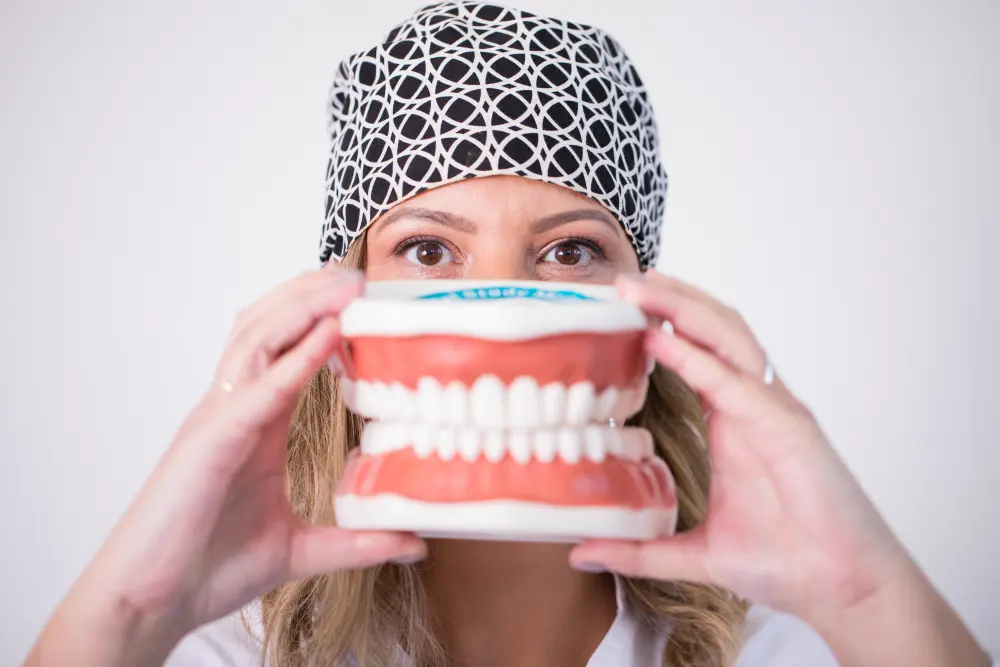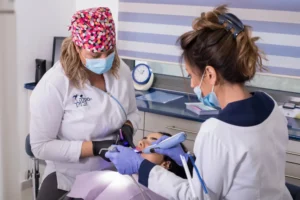Hello friends, this is Dr. Stela Heisler. In recent years I’ve seen quite a few patients who smoke and want to undergo dental implants in Jerusalem. It’s possible – but it’s important to understand the full picture: smoking has a significant impact on healing, on the implant’s integration with the bone (“osseointegration”), and on long-term stability. In this article I’ll explain the risks in simple terms and give clear recommendations on how to reduce them and increase the chances of success.
How does smoking affect dental implants?
For an implant to “take,” the body needs to build new blood vessels and form stable bone around it. Smoking disrupts almost every stage of this process:
- Blood flow and tissue oxygenation: Nicotine constricts blood vessels and impairs blood supply, and carbon monoxide reduces oxygen-carrying capacity. The result is slower healing and less formation of new blood vessels around the implant.
- Bone formation and resorption: Smoking weakens the activity of bone-forming cells (osteoblasts) and relatively increases the activity of bone-resorbing cells (osteoclasts). This makes it harder to form new, dense bone around the implant, especially in the first months.
- Immune system and oral bacteria: Cigarette smoke changes the composition of the biofilm (plaque) and favors anaerobic, inflammatory bacteria. At the same time, the local defensive response (neutrophils/macrophages) is weakened, so the risk of infection and inflammation around the implant (peri-implantitis) increases.
- Soft tissues and gums: Nicotine harms fibroblasts and collagen production – the material that gives tissue strength and elasticity. This shows up as a weaker gingival seal, a tendency toward gum recession, and less stable esthetics over time.
- Saliva and dry mouth: Smoking reduces salivary flow and changes pH. “Healthy” saliva protects tissues and suppresses bacteria; when the mouth is dry, more plaque accumulates and inflammation around the implant worsens.
- Heat and chemical trauma: The heat of the smoke and chemical toxins irritate the mucosa and the surgical wound. In the days after implantation this can open sutures, damage a bone graft/membrane, and slow healing.
- Not only cigarettes: Vaping, hookah, and chewing tobacco are not “neutral.” Nicotine and heating/flavoring agents still harm blood vessels, the microbiome, and healing.
- Dose-response and time effect: The more cigarettes per day and the more years of smoking, the higher the risk of bone loss, inflammation, and failure. Even so, a smoke-free window around surgery (at least 48-72 hours before and two weeks after, and ideally four weeks before and eight after) already improves healing conditions.
Bottom line: Smoking does not rule out implants, but it requires strict risk management – meticulous hygiene, proper surgical and prosthetic planning, and above all a reduction or cessation of smoking around the procedure.
The main risks for smokers
- Implant failure during healing – reduced quality and speed of osseointegration.
- Peri-implantitis – inflammation around an implant with loss of supporting bone.
- Slow healing and wounds that are difficult to heal – especially after bone grafting / sinus lift.
- Greater susceptibility to infections – including the need for longer medication.
- Gum recession and less stable esthetics – over time.
So who is still a candidate for implants?
In most cases, implants can be performed even for smokers, provided the risks are properly managed: improved hygiene, smoking reduction/cessation around surgery, precise surgical planning, and close follow-up. I make the decision together with you after a clinical exam, 3D imaging (CT), and an assessment of individual risk factors (general health, periodontal status, bone density, and more).
My recommendations for smokers before and after implantation
- Temporary (preferably permanent) smoking cessation: ideally 4 weeks before and 8 weeks after the implant. If that’s not possible, a minimum of 48-72 hours before and two weeks after helps significantly.
- Vaping and hookah: not a “healthy” alternative for implants – nicotine and thermal irritation continue to impair healing.
- Meticulous oral hygiene: gentle brushing with a soft brush, floss/interdental brushes as instructed, and sometimes medicated rinses for a limited time.
- Professional cleaning at the clinic: before and after the implant at fixed intervals to reduce inflammation and bacterial load.
- Stable restorative planning: I may recommend delaying full loading of the crown until advanced healing; in selected cases – a temporary solution that reduces forces.
- Cautious diet in the first days: soft, lukewarm foods; avoid hot/hard foods in the surgical area.
- Structured medical follow-up: check-ups according to a personalized protocol, and periodic imaging to assess bone around the implant.
- Cessation support: referral to workshops/counseling, and sometimes nicotine replacement (with your family doctor’s guidance) to keep the healing window smoke-free.
What does the process look like in my Jerusalem practice
- Diagnosis and 3D planning: review of the gums, alveolar bone, and overall health.
- A plan tailored for smokers: including a smoke-free window, hygiene, and load management on the implanted area.
- Precise surgical implantation: use of advanced equipment and up-to-date protocols to reduce tissue trauma.
- Guided recovery: precise home instructions and adjuncts as needed.
- Esthetic and functional restoration: a crown/bridge on the implant at the right time to ensure long-term stability.
- Ongoing maintenance: home hygiene + professional hygiene and regular follow-up – especially critical for smokers.
Frequently asked questions
Do I have to quit completely?
Ideally – yes. But even temporary cessation around the implant improves healing odds. Every smoke-free day counts.
I had an implant in the past as a smoker and everything was fine. Why be strict now?
Each implant is a new and different case. The cumulative risk of peri-implant diseases and bone loss exists, and being strict now will prevent future complications.
What about vaping?
Not recommended during healing; nicotine and other factors still impair blood flow and healing.
And if I can’t quit?
We’ll talk about a harm-reduction strategy: limiting smoking, choosing surgery timing that respects a smoke-free window, tight maintenance, and a restorative plan that reduces loads.
A personal note
My goal is for you to enjoy a healthy, stable smile for years to come. If you smoke and are worried – you’re not alone. Together we’ll plan a realistic and safe path to implant treatment, with full support every step of the way. Moreover, my professional and personal recommendation is to seriously consider quitting smoking altogether. This is the single step with the greatest impact on implant success, gum health, breath, and overall health. If you wish, I’ll guide you to cessation programs in Jerusalem, medication, and behavioral support, and we’ll build a “smoke-free window” around the implant as a foundation for full cessation. Even if you’re unsure – any reduction helps, and I’m here for you without judgment. You’re welcome to book a consultation at my Jerusalem clinic; I’ll be happy to meet you, explain, and create a plan tailored to you.




